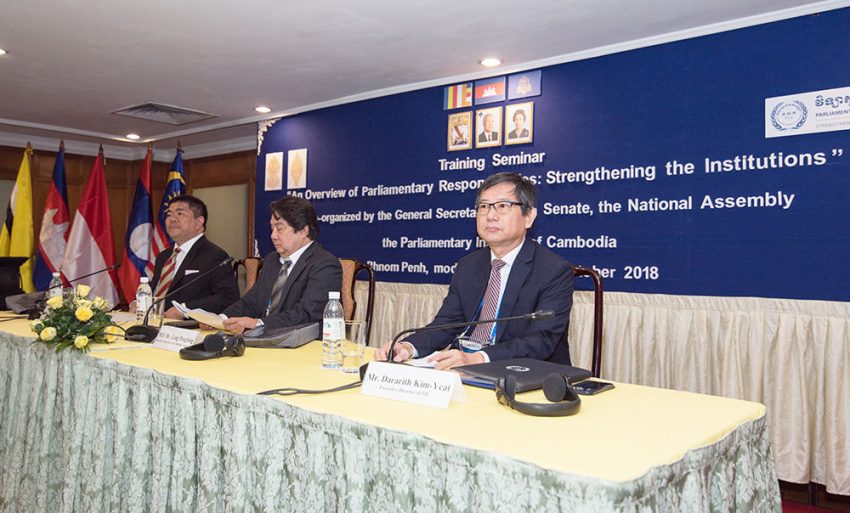The Parliamentary Institute of Cambodia (PIC), in collaboration with the Parliament of the Kingdom of Cambodia, has organized a week-long training seminar entitled “An Overview of Parliamentary Responsibilities: Strengthening the Institutions”. Around 80 participants are attending the event, which is divided into two modules: module 1, is being held in Phnom Penh from 1 to 5 October 2018, while module 2, planned for December 2018, will take place in Siem Reap.
The objectives of this training activity are to:
- Share theoretical and practical knowledge about specific aspects of parliamentary responsibilities, using examples from countries such as Belgium, Canada, France, Sweden and the US, among others;
- Facilitate networking opportunities and the exchange of good practice between Parliaments (North-South and Regional/South-South);
- Initiate the development of a body of knowledge in parliamentary affairs and practice in the ASEAN region.
Target participants are staff from AIPA member Parliaments from Brunei, Cambodia, Indonesia, Lao PDR, Myanmar, Thailand, the Philippines and Vietnam. Secretaries-General have also been invited and will join some of the sessions.
Presenters come from various legislatures around the world including the French National Assembly, the European Parliament, the Legislative Assembly of Ontario (Canada), the State Parliament of Zurich (Switzerland), the Swedish Parliament, the National Assembly of Quebec (Canada) and the Federation of Wallonia-Brussels (Belgium).
Topics covered during the training seminar (module 1) will include, among others, the different systems of Parliament, plenary sessions, the work of committees, the political groups, parliamentary research, relationships with constituents and other stakeholders, and parliamentary communications.
In his welcoming speech, Mr. Dararith Kim-Yeat, Executive Director of PIC, commented: “This event represents not only an outstanding occasion to learn and share experiences about various aspects of parliamentary work but also to create a community of practice: the aim is to foster knowledge exchange among parliamentary practitioners (North-North, South-South and North-South), and academics and researchers who have a particular interest in parliamentary matters. We also want to promote capacity building opportunities for parliamentary staff in our region, and hope that this initiative will facilitate the development of long-lasting ties between participants from ASEAN-Inter Parliamentary Assembly (AIPA) member Parliaments. In a wider context, our wish is that this event will also promote links with our counterparts from Parliaments in Europe, North America and Asia-Pacific.”
H.E. Mr. Isra Sunthornvut, Secretary General of AIPA, stressed the importance of the ASEAN countries and community as a whole, which is diverse yet unified. “Although we have differences in terms of knowledge and capacity,” he said, “and we argue with each other on a number of things, when it comes to protecting our community we always come together with a strong voice.
However, we still face some big gaps—between countries and their people, countries and countries, and between countries and the region as a whole.
“In this respect,” he added, “as parliamentary staff, we must share experiences and learn from each other in order to close those gaps by working together to set a unified form of working procedures.”
Speaking at the opening of the seminar, H.E. Mr. Leng Penglong, Secretary General of the Cambodian National Assembly, and H.E. Mr. Oum Sarith, Secretary General of the Cambodian Senate, said: “The Cambodian Parliament is like legislative bodies in other post-conflict countries, experiencing the same circumstances and similar institutional needs. A well–developed institution requires full commitment to fulfill its role, and this can be achieved only through highly professional human resources and strong commitment from individuals who make sacrifices for the sake of building the institution.” He continued: “In addition, we still have more work to do to ensure that Members of Parliaments enjoy support with professionalism in all aspects from parliamentary officials who are equipped to fulfill their role with full efficiency.”
He added: “ASEAN encompasses a diversity of parliamentary structures and regimes – single or bicameral chambers, presidential or parliamentary systems – with different styles. Some systems are single party, others multi-party, and all are based on different political ideologies. Similarly, the different levels of human resource development and capacity allow us to share experiences and learn from each other.
“For this reason,” he concluded, “we believe that this seminar is a good opportunity for us all. We hope that there will be many more similar events in the future.”

